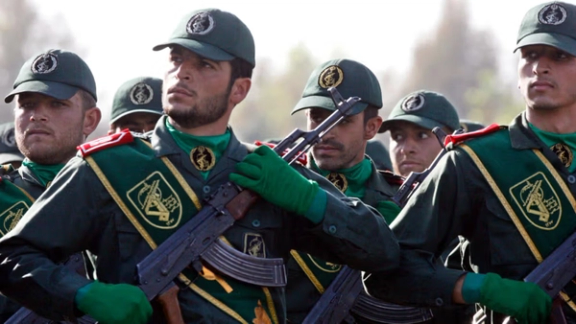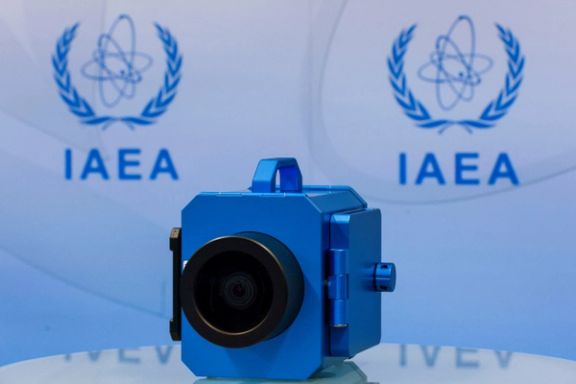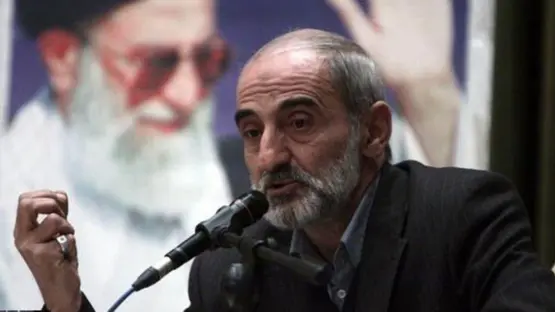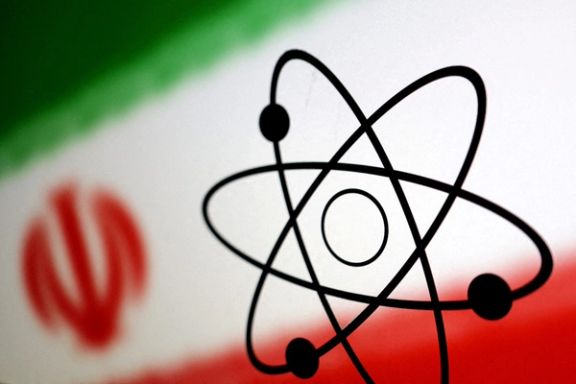Iran’s armed forces warn Ecuador over IRGC designation

Iran’s Armed Forces General Staff accused Ecuador of supporting the United States and Israel after Quito designated the Revolutionary Guards as a terrorist group.

Iran’s Armed Forces General Staff accused Ecuador of supporting the United States and Israel after Quito designated the Revolutionary Guards as a terrorist group.
“We warn the government of Ecuador not to serve the global domination system, America and Israel, and not to assist the false and satanic front,” the military body said in a statement carried by state media on Sunday.
Ecuador’s government on Tuesday designated the IRGC, along with Hamas and Hezbollah, as terrorist organizations.
The three groups, the decree added, pose a direct threat to public security and sovereignty of Ecuador.
Israeli foreign minister Gideon Sa’ar welcomed the decision on Tuesday.
“Ecuador’s courageous step sends a clear message against Iran’s terror network and strengthens global security,” Sa’ar wrote in a post on X expressing his thanks to Ecuadorian President Daniel Noboa and Foreign Minister Gabriela Sommerfeld.
Canada, Israel, Saudi Arabia and Bahrain have similarly blacklisted the IRGC.
Paraguay designated the IRGC as a terrorist organization in April and expanded its classification of Iran's Gaza and Lebanon-based military allies, Hamas and Hezbollah, to include all components of both groups.
The statement concluded that Iran’s military would continue to stand with Palestinians, Lebanon and Gaza, and that “no threat will weaken our resolve.”
Zahra Ershadi, director-general for the Americas at Iran’s foreign ministry, also criticized Ecuador’s move, describing it as “inappropriate”, warning that it would inflict serious damage on bilateral ties.

Cooperation with the UN nuclear watchdog will be suspended if European states push ahead with reinstating United Nations sanctions, Iran’s Supreme National Security Council said on Saturday.
The council, in a meeting chaired by President Masoud Pezeshkian, concluded that despite months of engagement with the International Atomic Energy Agency, “the path of collaboration will in practice be suspended" following the Europeans' push for reinstating UN sanctions on Iran, state media reported.
The foreign ministry was also tasked with continuing diplomatic outreach in line with the Council’s decisions.
On September 9, IAEA Director General Rafael Grossi and Iranian Foreign Minister Abbas Araghchi signed an agreement in Cairo that set out procedures for inspections, notifications, and reporting obligations.
However, Araghchi said at the time that the agreement would be scrapped if European powers proceed with reimposing UN sanctions on Iran through the so-called "snapback" mechanism.
President Pezeshkian in remarks made on Saturday rejected what he described as Western pressure over the country's nuclear program.
“They have decided to bring back the snapback (sanctions),” he said. “They can close the paths, but minds and ideas will build new ones. They can strike Natanz and Fordow, but people will create Natanz and even more important than Natanz. They cannot stop us.”
The UN Security Council on Friday rejected a South Korean-sponsored draft resolution that sought to permanently lift sanctions suspended under the 2015 nuclear deal. With that proposal defeated, all international sanctions are due to automatically snap back into place on September 28.
Iran’s currency weakened further on Saturday after the UN Security Council's vote. The dollar, which opened the day around 1,013,000 rials on the free market, rose above 1,035,000 by midday and later reached 1,036,700, according to local exchange trackers.

Tehran conducted a successful test of an intercontinental missile late Thursday, an Iranian parliamentarian said, after videos shared online appeared to show trails of smoke from the launches arcing upward in the sky.
“Two nights ago, we tested one of the country’s most advanced missiles, which had not been tested so far, and it was successful,” Mohsen Zanganeh told state broadcaster IRIB.
“I want to say that even under these circumstances, we are conducting a security test of an intercontinental missile.”
Residents across Tehran and in nearby cities including Gorgan, Sari and Semnan reported seeing the missile’s trajectory in the night sky. Eyewitness videos posted on social media showed arcs of smoke and light, while a Revolutionary Guards-affiliated channel shared images of the launch without claiming direct responsibility.
A local official confirmed missile tests had taken place around the capital on Thursday evening.
Intercontinental Ballistic Missile (ICBM)
Less than a month after the end of June's 12-day war with Israel, Iran conducted a suborbital test using a satellite launch vehicle in a move experts said showcased its defiance and determination to advance its strategic goals.
A 2019 report from the US Defense Intelligence Agency concluded that expertise in space launch vehicles “can be used as a test bed for developing an ICBM (intercontinental ballistic missiles).”
While the Islamic Republic has gained multi-stage launch capabilities through its satellite projects, there is no evidence yet of a fully developed intercontinental ballistic missile, Shahin Modarres, an international relations scholar and security analyst, told Iran International.
“Now the knowledge is there, but until this moment there has been no test and no sign of a built intercontinental weapon,” he said.
“If such a missile had been developed, Israel would already be within range, but the danger would also extend to Europe, while questions remain over whether they have the guidance systems or technology to reach the United States.”
Western governments have repeatedly voiced concern over Iran’s satellite launches, warning that the same rocket technology can be used for intercontinental ballistic missiles. Tehran, however, says its space program is peaceful.
Push for atomic bomb
Hardline voices in Iran's parliament are pushing for escalatory steps after the UN Security Council voted against lifting sanctions against Iran ahead of the so-called "snapback" of UN embargoes on September 28.
“Withdrawing from the NPT, adopting a policy of ambiguity and ultimately testing the atomic bomb is the only option that can spare Iran the fate of Iraq and Libya,” Ahmad Naderi, a member of the parliament’s presiding board said on Saturday.
"Experience has shown that countries without nuclear deterrence eventually become victims of invasion or regime change. The time has come to make hard but necessary decisions."
Iran denies seeking nuclear weapons citing a fatwa by the Supreme Leader and insists that its missile program is defensive. Yet several high-ranking officials have in recent years talked about the necessity of developing an atomic bomb and the possibility of changing the "nuclear doctrine".

Hossein Shariatmadari, the representative of Supreme Leader Ali Khamenei in the hardline daily Kayhan, has called for Iran to withdraw from the Nuclear Non-Proliferation Treaty (NPT) following the UN Security Council’s decision not to permanently lift sanctions.
Writing in Kayhan, Shariatmadari argued that two decades of negotiations had failed to protect Iran’s nuclear facilities from attacks, saying that “remaining in the NPT no longer makes sense” and that Iran’s only option was to strengthen deterrence.
“Those who say that if we leave the NPT it will pave the way for an attack must answer two questions. First, did they not attack our nuclear facilities while we were in the NPT? Second, does not America insist that attacks on Iran’s nuclear facilities should not be prohibited? … So what are you waiting for?” he wrote.
The 15-member UN Security Council on Friday opted not to permanently lift sanctions on Tehran, after Britain, France and Germany launched a 30-day process last month to reimpose them, accusing Iran of failing to comply with the 2015 nuclear deal.
Shariatmadari dismissed the return of UN sanctions under the so-called snapback mechanism as “an empty shell” compared with US secondary sanctions.
“For years Iran’s economy has been under the pressure of Washington’s multilayered sanctions, which are far broader and harsher than the UN’s restrictions," he wrote.
"The snapback (mechanism) neither brings extra sanctioning power nor grants a fresh license for war,” he wrote.
Lawmakers warn of NPT pullback
Shariatmadari’s call was echoed by lawmakers who also warned Iran could scale back its cooperation with international nuclear agreements.
"We warn the countries that exploit Iran's goodwill for 'dialogue' and close the doors of diplomacy to themselves that 'maximum pressure' never works, and this time they will regret it harder than ever," said Ebrahim Azizi, head of the Iranian parliament’s National Security and Foreign Policy Committee.
Another lawmaker, Fada-Hossein Maleki, said the country was prepared to scale back cooperation with international bodies. "The Islamic Republic is prepared for any scenario, including withdrawal from the agreement with the International Atomic Energy Agency (IAEA) and even seriously considering withdrawal from the Nuclear Non-Proliferation Treaty (NPT)," he said.

Iran proposed retrieving its stockpile of near-bomb-grade uranium and diluting it to a lower purity in exchange for sanctions relief, according to media reports, in an offer European powers rejected earlier this week.
Iran's foreign ministry in a statement on Friday criticized the three European powers for dismissing "Iran’s reasonable proposal—which they themselves admitted was logical."
The proposal cited by the foreign ministry was presented to European officials during Foreign Minister Abbas Araghchi’s phone call with his counterparts on Wednesday.
According to details of the proposal revealed by Wall Street Journal correspondent Laurence Norman, Iran proposed diluting its 60% uranium stockpile to 20% in exchange for US sanctions relief along with the extension and then voiding of a Security Council Resolution which enables UN sanctions on Iran to resume.
Iran would also pledge to meet with the US president's special envoy Steve Witkoff, according to Norman's sources, in an apparent bid to fulfil the Europeans' demand Iran reengages in talks with the US.
Iran, he wrote, would do that in return for a US guarantee against any new military attack.
Highly enriched uranium stocks
The Wall Street Journal's report said that Iran has proposed to "retrieve all the 60% (enriched uranium) it could. Once retrieved, the UNSC would kill Resolution 2231 supporting the JCPOA."
In return, the report added, Iran said it would commence physically retrieving its stockpile of 60%-enriched uranium and then diluting it to 20% purity.
The fate of Iran’s highly enriched uranium (HEU) stockpile of 400 kg (882 pounds) remains under investigation, while Tehran claims it is trapped under rubble after US attacks on three nuclear sites in June.
“A wise colleague also points out that once Iran retrieves the HEU stockpile, if the deal then stalls, Tehran has solved one big problem it currently faces," Norman said. "Right now, if it retrieves the stockpile, it could face military action. This Iranian suggestion instructs Iran to retrieve it."
The London-based Amwaj Media also reported on Friday that Araghchi had been in touch with Witkoff on the proposal.
'Actionable plan'
French President Emmanuel Macron said on Thursday that Iran’s Foreign Minister “tried to make a reasonable offer” to reach a deal with European powers but did not receive backing from other members of the Iranian ruling system.
Abbas Araghchi reacted to reports on the proposed deal, saying Tehran provided an “actionable plan.”
“Instead of being met with engagement on the substance of this plan, Iran is now faced with a litany of excuses and outright deflection, including the farcical claim that the Ministry of Foreign Affairs does not represent the entire political establishment,” Araghchi said.
“I have the full support of the entirety of the Islamic Republic of Iran, including my country's Supreme National Security Council,” he added.

Viral videos of women dancing unveiled in Iranian concerts have reignited debate over whether the apparent social opening is genuine or contrived by a ruling system facing external military pressure and domestic discontent.
For musician Arash Sobhani—a solo artist in exile in the United States and frontman of the acclaimed Iranian band Kiosk—the answer is complicated but clear: there is no real reform afoot, only a choreographed spectacle.
“Reform happens if we see a woman singer, if you see a female singer on stage, that would have been a reform,” said Sobhani, who left Iran in 2005 after performing underground in Tehran for two years.
A recent Sirvan Khosravi concert on the grounds of the former Shah’s palace in Tehran has become a touchstone for the debate.
Videos flooding social media show women in the audience discarding the compulsory hijab and dancing openly—acts that were harshly punished until recently.
The imagery from a site tied to Iran’s ousted monarchy struck some observers as a sign Tehran may have relaxed old taboos.
Sobhani urged caution. “We want people to be happy. Everybody should be happy all the time,” he told the Eye for Iran podcast. “But let’s not just close our eyes and ignore the elephant in the room. Female singers, your colleagues are not allowed to sing, yet, still, and nothing has changed.”
He argues that venue choice and access matter. Staging concerts in controlled, ticketed spaces—often priced beyond the reach of many—differs fundamentally from allowing free, mass gatherings in iconic public squares.
“They (the Islamic Republic) want (events) in closed spaces, not more than 2,000 to 3,000 people … because they can control that,” he said, contrasting it with a hypothetical crowd of “100,000 people” in a central square.
The push and pull were visible beyond Tehran. In Shiraz, the popular band Bomrani performed to jubilant scenes that some hailed as a cultural opening—only for authorities to ban the group from playing in the city and the wider Fars province days later, accusing it of “norm-breaking behavior.”
The reversal underscored how precarious such moments remain.
Joy is not structural change
Sobhani acknowledges that public joy can itself be opposition—but warns against mistaking it for structural change.
“Joy in the way we live is an opposition, is a form of rebellion, is a form of protest ... but ... as long as these guys are in power, no change is permanent. It’s just going to be temporary, makeshift, just cosmetic ... that’s going to be gone in two days.”
The concerts arrive amid the enduring legacy of Mahsa Jina Amini, whose September 2022 death in morality police custody sparked the Woman, Life, Freedom protest movement.
While the demonstrations were crushed, visible social shifts—like widespread noncompliance with hijab rules at public events—have persisted.
A proposed new hijab and chastity law was put on hold earlier this year amid concerns it could inflame tensions, even as authorities continue arrests and executions.
For Sobhani, the real test isn’t a few exuberant nights but who gets to stand on stage and who gets to attend without fear. Until women can sing freely and artists can speak without reprisal, he says, viral concerts are—at best—nuanced snapshots of resilience, not proof of reform.
You can watch the full episode of Eye for Iran with Arash Sobhani on YouTube, or listen on Spotify, Apple, Amazon, Castbox, or any podcast platform of your choosing.